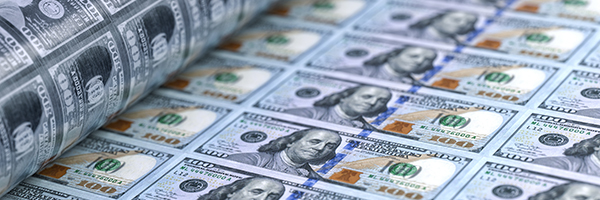
April 27, 2025 | Daily JAM |
Fast-fashion giant Shein Group raised U.S. prices of its health and beauty products by 51% or more. E-commerce shopping platforms like Shein and Temu face a 120% tariff on many of their products due to the U.S. government’s decision to end the “de minimis” exemption for small packages from mainland China and Hong Kong. Exporters in recent years had capitalized on the exemption, which allowed goods valued at under $800 to enter the U.S. without tariffs or customs duties. Washington will also increase the per-postal-item fee on goods entering after May 2 to $100 and even higher after June 1

April 27, 2025 | Daily JAM, Morning Briefing |
President Donald Trump’s tariffs on goods from China have disrupted trans-Pacific supply chains. In the three weeks since the tariffs took effect, ocean-container bookings from China to the U.S. are down by more than 60%, Ryan Petersen, founder and CEO of Flexport, a global shipping company, told the Washington Post. Cargo carriers that bring Asian goods to the Port of Los Angeles, the nation’s main Pacific gateway, have canceled 20 port calls next month, more than three times as many as last month, according to port data. The consequence will be “empty shelves in U.S. stores in a few weeks and covid-like shortages for consumers and for firms using Chinese products as intermediate goods,” Torsten Slok, chief economist for Apollo Global Management, told the Post. “Significant” layoffs in trucking, logistics and retail are likely as soon as May, Slok said.

April 26, 2025 | Daily JAM |
Finally, maybe some hard data on how President Donald Trump’s tariffs are affecting the U.S. economy. At 8:30 New York time om Wednesday the Bureau of Economic Analysis is scheduled to release its first take on the GDP rate in the first quarter of 2025. Economists surveyed by the Wall Street Journal project the U.S. economic output rose at an annual rate of just 0.4% in the first quarter. That would be down from 2.4% in the last quarter of 2024 and the slowest growth since 2022. This will be the first hard data that might show the impact of President Trump’s tariff moves.

April 25, 2025 | Daily JAM, PEP |
On Thursday, PepsiCo cut its full-year guidance outlook, citing a reduction in consumer spending as well as the impact of higher tariffs.
“Relative to where we were three months ago, we probably aren’t feeling as good about the consumer now,” Jamie Caulfield, PepsiCo CFO, told Wall Street analysts and investors on an earnings call Thursday morning.

April 25, 2025 | Daily JAM, Morning Briefing |
The S&P 500 gained more than 4% for this week. Some of that was the result of talk from the White House about possible tariff negotiations with China.As the week wore on, though, attention shifted from tariff talk to comments from Federal Reserve officials that seemed to suggest that the central bank might consider cutting interest rates as early as its June meeting if economic growth slowed. Yep, the Powell Put is back. In this scenario, bad earnings and bad economic news become good news because they push the Federal Reserve closer to cutting interest rates.

April 25, 2025 | Daily JAM, Morning Briefing |
First, the optimists among economists who believe the United States will dodge a Recession. And then the pessimists who say we’ll see the economy shrink in the first quarter of 2025. (First quarter GDP is scheduled to be reported on the morning of April 30.)

April 24, 2025 | Daily JAM |
President Donald Trump said his administration is talking with China on trade. This came after Beijing denied the existence of negotiations on a deal and demanded the United States revoke all unilateral tariffs. “They had a meeting this morning,” Trump said Thursday during a meeting with Norway’s prime minister when a reporter asked about the Chinese statement. Pressed on which administration officials were involved in discussions, President Trump said, “it doesn’t matter who ‘they’ is. We may reveal it later, but they had meetings this morning, and we’ve been meeting with China.” Not so, Chinese Commerce Ministry spokesman He Yadong said Thursday.

April 24, 2025 | Daily JAM, Mid Term |
Unilever (UL) and Nestle (NSRGY) both posted better-than-expected sales in the first quarter. Because they were able to push prices higher to counter surging commodity costs.
That’s not good news for consumers or food-price inflation. Both companies said customers will have to take some of the pain as a global trade war and surging commodity prices lift their costs again.

April 24, 2025 | Daily JAM, Morning Briefing |
Yesterday stocks rallied for a second day on “news” that President Donald Trump was considering plans to cut tariffs on China’s goods. The Wall Street Journal reported that under the proposals, the range could come down to between 50% to 65%–from the current 145%–as a result of a tiered approach that would see 35% levies on items not considered critical for national security and 100% on “national security” goods.“We’re going to have a fair deal with China,” President Trump told reporters on Wednesday. On Tuesday President Trump had said he’d be willing to “substantially” pare back his 145% tariffs on China. He turned down his aggressive rhetoric a day after meeting with executives from Walmart, Home Depot. and Target, who said import taxes could disrupt supply chains and raise the prices of goods., according to people familiar with the matter. I understand why stocks rallied on these reports. Investors and CEOs are all scared that these tariffs will reignite inflation and send the economy toward recession. The rally on these reports is a sign of how deeply worried financial markets are at this posibility. And how much markets want to believe in a change of course. But because of the intensity of that hope Wall Street and, especially, retail investors, are overlooking the “fine print” in these announcements.

April 23, 2025 | Daily JAM |
Cultivated dinosaur meat hits the market in food tech first

April 23, 2025 | Daily JAM, Morning Briefing, Short Term |
Despite the rally on Tuesday and Wednesday, the S&P 500 Index is still down around 4% since April 2, the day President Donald Trump announced his tariff plans. Where do stocks go from here in the short term? Depends on the headlines on tariffs and the Federal Reserve, I’d say But the trend in volatility is clear. Stocks are swinging wildly day to day. Since April 2, the Standard & Poor’s 500 has posted five declines of more than 2% and two gains of more than 2% in just 14 sessions.

April 22, 2025 | Daily JAM, Jubak Picks, Morning Briefing, Top 50 Stocks |
I just don’t see the upside here. Even companies that are announcing solid earnings beats are issuing cautious guidance. And as we can see from the example of UnitedHealth Group (UNH) when a stock misses this market doesn’t just take it out to the woodshed for punishment, but stands it up against the barn and shoots it.















